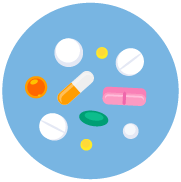Table of Contents
You're ready to work, but suddenly you hit a wall. No matter how sharp or productive you usually are, 'brain fog' can strike, diminishing your focus and drive. No matter how sharp and productive you usually are, "brain fog" can affect even the best of us, making us feel less motivated and productive no matter how much caffeine we consume.
So what causes these annoying “brain fog” moments in the first place? And more importantly, how can you stop it from getting in the way of your work and daily life? In many instances, the answer starts with your diet.
What is Brain Fog?
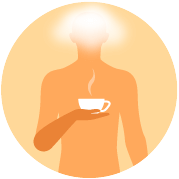
Everyone has had those moments where finding the right word seems impossible or you forget why you walked into a room.
"Brain fog" isn't an actual medical term, so it's probably not something you can get a medical diagnosis for. Instead, it's a general term that refers to any feelings of impaired cognition that get in the way of your ability to think clearly and function normally. In other words, brain fog might make you feel "foggy" rather than sharp and focused.
If you’re experiencing symptoms of brain fog, you might be:
- having a hard time concentrating
- experiencing difficulty learning and retaining new information
- struggling with short-term memory
- lacking motivation and energy
- dealing with irritability and mood swings
What Causes Brain Fog?
Because "brain fog" is not an official medical diagnosis (and because its effects can be so generalized), it's not always easy to pinpoint the exact cause behind it. Sometimes, general "brain fog" can be a symptom of more serious underlying health concerns, so it's important to talk to your doctor if you can't address your cognitive concerns with lifestyle changes.
However, there are plenty of instances in which brain fog is caused by factors that may not warrant a medical diagnosis. Common things that contribute to brain fog include certain medications, hormones, poor sleep quality, chronic stress, nutrition deficiencies, and neuroinflammation.
a. Medications that cause brain fog
Certain medications are known to impact your cognitive abilities shortly after taking them, including painkillers, antidepressants, and sleep medications. Because your hormones also play a role in your brain health, some scientists believe hormonal birth control can contribute to brain fog.
b. Hormones
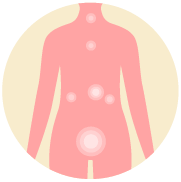
On a related note, an imbalance of hormones is also thought to play a role in foggy cognition. For example, some women report that they experience brain fog and issues with cognitive functioning during their menstrual cycle, which naturally causes fluctuations in sex hormones like estrogen and progesterone. Brain fog is also a common symptom reported during the menopausal transition, another time in which estrogen and progesterone levels fluctuate.
Maintaining a balanced diet, staying active, and managing stress can help alleviate some of these hormonal fluctuations.
c. Poor sleep quality
A night of poor-quality sleep can also directly impact your cognition the next day, leaving you feeling tired and groggy all day. You might even feel like you’re getting enough hours of sleep and still feel like you’re running on empty the next day due to low-quality sleep. For example, people with obstructive sleep apnea (OSA) tend to report brain fog due to both interrupted sleep cycles and lower oxygen intake.
Prioritizing a regular sleep schedule and creating a calming bedtime routine can make a significant difference.
d. Chronic stress
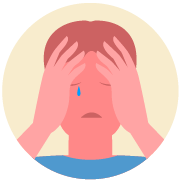
Many people in this day and age find themselves dealing with stress fairly frequently. Unfortunately, all of that stress can take its toll on your brain over time – studies have found that chronic stress is known to be associated with poor cognitive functioning.
e. Nutrient deficiencies
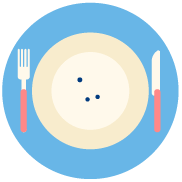
Virtually every cell in your body depends on the nutrients you take in from your diet, including your brain cells (otherwise known as your neurons). Not only are vitamins, minerals, and other macronutrients important for your normal cell function, but poor nutrition can also directly impact your energy levels, making matters worse. If you can't get all the nutrients you need from food alone, you may need to take vitamins for memory and brain fog.
For instance, Omega-3s, found in fish, are crucial for cognitive function, while B-vitamins, abundant in leafy greens, aid neurotransmission.*
f. Neuroinflammation
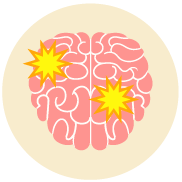
Some instances of brain fog can come down to neuroinflammation. While inflammation typically helps combat pathogens, chronic inflammation can be detrimental. In cases of neuroinflammation, it's the brain's neurons that suffer.
g. Effects of Dehydration on Cognitive Abilities
Even mild dehydration can negatively impact cognitive abilities. A lack of adequate water can result in difficulties concentrating, short-term memory problems, and feelings of fatigue. Studies have shown that dehydration can impair attention, long-term and working memory, and even increase feelings of anxiety and perceived task difficulty.
Supplements for Brain Fog
Brain fog can be influenced by many factors, including dietary quality. For those struggling with cognitive clarity, certain memory supplements and vitamins for brain health can offer significant relief. Taking these vitamins for brain fog can improve your intake of these essential nutrients, giving your brain the tools it needs to operate at its sharpest and brightest.*
Remember: brain fog is multifaceted, and it can sometimes indicate that something more serious is going on with your health. Be sure to check in with your doctor before taking any supplements. Talk to them if your brain fog is prolonged and not quickly addressed by supplements and lifestyle changes to rule out any underlying medical conditions.

1. Omega-3 fatty acids
Of all the many different kinds of dietary fats out there, omega-3 fatty acids are among the healthiest fats, especially if you're concerned about your brain health. Several studies have shown that omega-3 fatty acid deficiencies can significantly impact your cognitive abilities.* For example, rodent studies have shown that low omega-3 levels lead to poor memory and impaired learning. In contrast, human studies have associated a deficiency of omega-3s with mental disorders like ADD, dyslexia, dementia, and depression.*
Most notably, you want to be paying attention to your intake of docosahexaenoic acid (DHA), a type of omega-3 fatty acid that is a significant component of your brain cell structure. One of the best ways to get enough DHA in your system is to take an omega-3 supplement like algae oil, which contains DHA and eicosapentaenoic acid (EPA), another essential omega-3 fatty acid.
Sources: Algae oil (rich in DHA and EPA), fatty fish like salmon and mackerel, flaxseeds, and walnuts.
2. Vitamin D
Vitamin D is both a vitamin and a hormone, and it seems to play a critical role in protecting your brain and overall mental health. Researchers have found that Vitamin D has anti-inflammatory, antioxidant, and neuroprotective properties. Supplementing Vitamin D can help protect people from neurocognitive decline and improve executive functioning. *
Vitamin D is sometimes referred to as the "sunshine vitamin" because your body can synthesize it on its own when your skin comes into direct contact with sunlight. Unfortunately, Vitamin D deficiencies are still prevalent around the world. It isn't found in many natural food sources, which may warrant supplementation instead.
Sources: Sun exposure (natural synthesis), fatty fish, fortified dairy products, and egg yolks.
3. Vitamin B-12
Vitamin B-12 is another key vitamin that can lead to poor cognitive function when someone has deficient levels of it in their body. This vitamin plays an essential role in the formation of your central nervous system, which includes your brain, as well as in the formation of red blood cells. It's especially critical for vegans and vegetarians to be taking a B-complex vitamin that contains B-12 since it is most notably found in animal-based foods like meat.*
Sources: Lean meats, dairy, eggs, leafy greens. B12 is primarily in animal products, making supplementation crucial for vegans and vegetarians.
4. Iron
Iron is a mineral that is necessary for the formation of healthy red blood cells. Because red blood cells are required to transport oxygen to all the cells in your body, having an iron deficiency can have severe consequences, one of which is fatigue from iron deficiency anemia.*
Women are especially prone to iron deficiencies, as well as vegans and vegetarians, so you may need to take an iron supplement in these cases.
Sources: Red meats, dark leafy greens, legumes, and fortified cereals.
5. Magnesium
The mineral magnesium is a critical component that catalyzes many different processes in your body, including things going on inside your nervous system. Researchers believe that getting enough magnesium can help manage your body's stress response, one of the significant factors contributing to brain fog and poor cognition.*
A 2008 study even found that higher magnesium and zinc levels correlated to increased academic performance among a sample of adolescent girls. However, more research needs to be done to understand this correlation.
Sources: Nuts, seeds, whole grains, and dark chocolate.
6. Vitamin C
Vitamin C has a reputation as a powerful immune booster. It works so well because it is a great antioxidant that can combat oxidative stress. Your body contains both antioxidants and “free radicals,” or highly reactive ions that can cause damage to your cells.*
Antioxidants work to counterbalance these free radicals, but under certain circumstances, like poor diets, aging, and pollution, your free radicals can begin to outnumber your antioxidants. This imbalance is called “oxidative stress” and can go on to damage your cells, including your brain cells. So as it turns out, this powerful antioxidant effect can also help protect your brain!
Sources: Citrus fruits, bell peppers, strawberries, and broccoli.
7. Vitamin E
Vitamin E is another good antioxidant vitamin to take for fighting off oxidative stress and its impacts on your brain health. Studies have shown that having high levels of Vitamin E is often associated with better cognitive performance. Scientists are also investigating whether or not this antioxidant can help slow down the gradual effects of neurodegeneration that come with aging.*
Sources: Nuts, seeds, spinach, and vegetable oils.
Conclusion
Brain fog can be extremely frustrating, standing between you and your ability to operate at your maximum capacity. But by tweaking your diet and taking the vitamins for memory and brain fog, you can optimize your nutrient intake and address many of the top causes behind that annoying cognitive fog.


